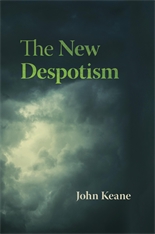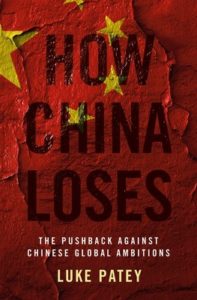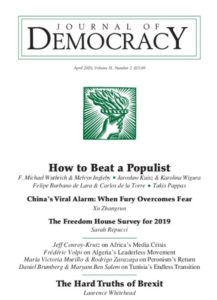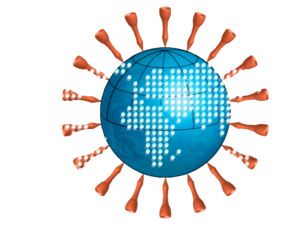Surely among the strangest and least expected outcomes of the Great Pestilence is that the country that hatched the virus looks as though it will now enjoy the technological and soft power advantages of being the first major political economy to shake it off, argues John Keane,* author of The New Despotism (Harvard University Press, May 2020):
 This pestilence may in fact be its golden moment, a second Nixon-Kissinger tipping point when without firing a shot the country takes geo-political full advantage of the present coughing and chaos in the United States to surge ahead, to resume building its global empire, so finally shattering the illusion of American superiority. The People’s Republic of China could be the first big power to stand up after the world had fallen down. Dreamy hopes of expanded ‘global co-operation and trust’ (Yuval Noah Harari) would be dashed.
This pestilence may in fact be its golden moment, a second Nixon-Kissinger tipping point when without firing a shot the country takes geo-political full advantage of the present coughing and chaos in the United States to surge ahead, to resume building its global empire, so finally shattering the illusion of American superiority. The People’s Republic of China could be the first big power to stand up after the world had fallen down. Dreamy hopes of expanded ‘global co-operation and trust’ (Yuval Noah Harari) would be dashed.
Despotism would then be the future of democracy, Keane contends. (HT: COVID-DEM at Democratic Decay).
But both Russia and China’s strategic communications efforts are similarly fallible, notes Chatham House expert Keir Giles:
- China’s notoriously heavy-handed approach to its critics is of only limited use in the face of such a severe and immediate threat. One suggestion that the virus originated in the US – an early response to US criticism – has already been walked back by the Chinese diplomat who made it.
- And Russia continues to be capable of spectacularly misjudging its targets. When investigative journalists looked more closely at the nature of the assistance to Italy, Russia’s official response was rage and personal threats, laying bare the real nature of the campaign and immediately alienating many of those whom Moscow had sought to win over.
The EU’s high representative for foreign affairs, Josip Borell, has pointed to how China spun ‘the politics of generosity’, Andrés Ortega writes for the Madrid-based Elcano Royal Institute. If democracies need inspiration from Asia, they should rather look to the democratic South Korea and Taiwan, which used electronic tracking with people’s consent and relied on an engaged citizenry.
Beijing’s initial blunder in responding to this public health crisis is hard to forgive. But its pandemic diplomacy should now focus on humanitarian efforts, rather than a clumsy, self-righteous global political campaign, writes @Yu_JieC for @SCMPNews.
 To a large extent Borrell’s ‘global battle of narratives’ is a return to ideologies under a new guise, and accompanied by the instrument of healthcare aid, Ortega adds. The crisis is going to be highly defining in terms of ideologies. China has a great deal to gain. Neoliberalism has taken a mortal blow and how democratic liberalism will fare remains to be seen.
To a large extent Borrell’s ‘global battle of narratives’ is a return to ideologies under a new guise, and accompanied by the instrument of healthcare aid, Ortega adds. The crisis is going to be highly defining in terms of ideologies. China has a great deal to gain. Neoliberalism has taken a mortal blow and how democratic liberalism will fare remains to be seen.
The long arm of Beijing’s information operations even reaches into small Swiss villages, analyst Kathrin Ammann writes:
On March 9, ten municipalities in the French-speaking canton of Vaud received post from the cantonal government. They all planned to take part in a flag-flying campaign for Tibet organized annually by the Swiss-Tibetan Friendship Society (GSTF) to commemorate the 1959 Tibetan uprising against the Chinese occupiers. The letter from the Vaud government, obtained by swissinfo.ch, urged the municipalities to abstain from raising the Tibetan flag… Three days earlier, the Chinese ambassador had written to the government of canton Vaud asking it to call on the municipalities to desist from raising flags and other demonstrations of solidarity.

National Endowment for Democracy (NED)
“These kinds of intervention by China happen constantly all over Europe,” says Ralph Weber, a professor at the Europa Institute at Basel University. “Taken together, you start to recognize certain patterns….It’s about soft power, but also about what we in academia refer to as sharp power.”
These patterns can be traced back to the activities of the so-called United Front, Weber says. The United Front is an organisation inside the Chinese Communist Party that has gained considerable influence since President Xi Jinping took office eight years ago. One of its tasks is to manipulate foreign institutions to promote China’s interests abroad, Ammann adds.
But it is doubtful that Beijing’s gambit will succeed in turning a pandemic that likely started in a Chinese city into a major step in China’s rise, according to Michael J. Green, CSIS Senior Vice President for Asia and Japan Chair, and Evan S. Medeiros, Penner Family Chair in Asian Studies at Georgetown University. There are real limits to China’s capacity to take advantage of the current crisis—whether through disingenuous propaganda or ineffective global action, they write for Foreign Affairs:
And just as the potential for China to benefit from the coronavirus is too easily overstated, the ability of the United States to show global leadership even after its initial missteps is too easily discounted. As deeply flawed as Washington’s response to the pandemic has been so far, the United States’ power—distinct from any particular president—rests on an enduring combination of material capabilities and political legitimacy, and there are few signs that the pandemic is causing power to shift rapidly and permanently to China’s side of the ledger.
 Beijing’s refusal to admit its mistakes in not halting the virus early on and self-defeating propaganda ensure that despite its medical assistance it will not emerge from the coronavirus crisis as a global champion, adds Luke Patey, senior researcher at the Danish Institute for International Studies and author of the forthcoming book “How China Loses: The Pushback against Chinese Global Ambitions.”
Beijing’s refusal to admit its mistakes in not halting the virus early on and self-defeating propaganda ensure that despite its medical assistance it will not emerge from the coronavirus crisis as a global champion, adds Luke Patey, senior researcher at the Danish Institute for International Studies and author of the forthcoming book “How China Loses: The Pushback against Chinese Global Ambitions.”
In fact, the experience of Europe shows why there are several reasons why China’s current PR drive might backfire, according to Carnegie analysts Erik Brattberg and Philippe Le Corre:
- First, after a wobbly initial start, a more coordinated common European response to the coronavirus is now finally shaping up. As a result, China is denied the opportunity to exploit the lack of European solidarity and present itself as the only actor capable of assistance….
- Second, efforts to push back against Chinese propaganda and disinformation in Europe are now underway…..Huawei decided to scale down its European mask donation program for fear of becoming embroiled in a wider geopolitical powerplay. In another example, a unit in the External Action Service normally devoted to debunking Russian disinformation has recently documented a series of Chinese coronavirus propaganda narratives in what appears to be a copy of the Russian disinformation playbook in Europe…..
- Third, reports of faulty Chinese medical equipment and supplies have triggered outrage. Countries such as Spain, the Netherlands, and the Czech Republic have already returned Chinese-made test-kits. Problems with Chinese-made masks have also been reported in several countries. These concerns will likely feed long-standing European distrust of Chinese product safety standards. ….
 Fourth, the skepticism toward China among both European elites and the public is not likely to change, as it is driven by deeper economic and political concerns about China’s rise. Some Italian voices, for example, have reacted strongly against China’s push – sometimes asking for “war damages” instead. If anything, it underscores the more hawkish European position enshrined in an EU strategy paper on China from a year ago, which referred to the country as a “systemic rival.”
Fourth, the skepticism toward China among both European elites and the public is not likely to change, as it is driven by deeper economic and political concerns about China’s rise. Some Italian voices, for example, have reacted strongly against China’s push – sometimes asking for “war damages” instead. If anything, it underscores the more hawkish European position enshrined in an EU strategy paper on China from a year ago, which referred to the country as a “systemic rival.”
The April issue of @JoDemocracy is hot off the presses—featuring the Chinese Communist Party’s response to the #coronavirus outbreak, and more—free through May 31 @ProjectMUSE
Emerging information tools and technologies have the potential to stymie the domestic foundation for projecting power — a danger partly embodied by what a new report calls “virtual societal warfare,” notes RAND analyst Michael J. Mazarr. As advanced societies become increasingly dependent on information networks, algorithmic decision-making and a super-integrated “Internet of Things,” and as the ability to manipulate truth becomes more prevalent and powerful, the potential for an outside actor to create mischief will be very great, he writes for War On The Rocks.
Democratic Advantage
Democracy has longer-term resilience because of its engaged citizens, argues Jonas Parello-Plesner, Visiting Fellow at the GMF Asia Program:
In Italy, initially the hardest-hit country in Europe, citizens in isolation are voluntarily cheering and applauding their health workers each evening from their balconies. …. A German civic-tech hackathon has produced thousands of suggestions for helping out in the crisis. In the Czech Republic and elsewhere in Europe, media freedom assures that critical questions can be raised, including on Chinese-made testing equipment that arrived in faulty condition. And by now, assistance among EU member states dwarfs China’s. There is no naivety about China’s aid, either.

@NDITech
Following the 2008 global financial crisis, it was the authoritarian right, not the progressive left, that managed to gain a foothold in many countries, notes Laurie Macfarlane. The same can be said of the Great Depression in the 1930s. As governments struggle to deal with an economic crisis on a scale that could easily surpass both, there are signs that authoritarian forces could stand to benefit once again, he writes for Open Democracy.
In April last year, the historian Adam Tooze noted that: “As of today, it is a gross exaggeration to talk of an end to the American world order. The two pillars of its global power – military and financial – are still firmly in place. What has ended is any claim on the part of American democracy to provide a political model.”
Social-media companies must flatten the curve of misinformation, says @IlvesToomas @AoDemocracies TCEI commissioner @ilvesToomas #DefendDemocracy







